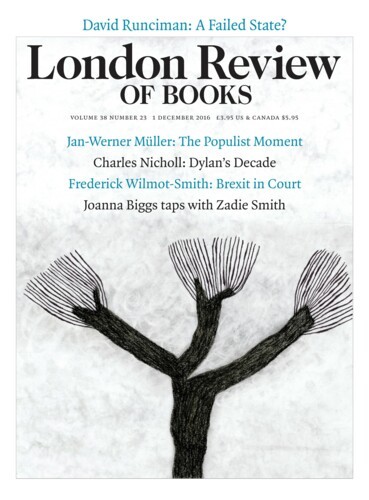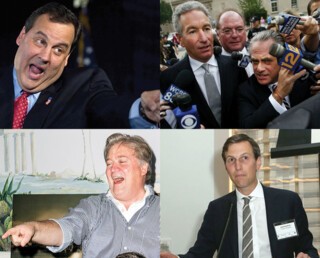The springtime fun of watching Donald Trump humiliate and eliminate his Republican rivals has now been ruined by his victory over Hillary Clinton on 8 November. The polls had it that he would only be able to wreck one party. Now he has wrecked both of them. The upshot is that Clinton will never have the chance to invade Syria or reverse climate change and the Republicans have lucked into the sort of power they haven’t enjoyed in a decade.
The days in the wake of the election have mixed liberal hysteria – fascism and autocracy spiked with racism, sexism and xenophobia – with gleeful professional-class ogling at the shambolic appearance of Trump’s transition plans. He didn’t know how many people worked in the White House and that they’d all have to be replaced. He neglected to call the State Department before he called Putin. Obama charmed him during their first meeting, and now he may keep some bits of Obamacare – forget all those years he spent saying the president was born in Kenya. He demoted the leader of his transition team, Chris Christie, the New Jersey governor mired in his own scandal for allegedly having his aides pursue a vendetta against a local mayor and now allegedly the victim of a vendetta on the part of Trump’s son-in-law, the real estate scion and entrepreneur Jared Kushner. In 2005 Kushner’s father, Charles, was convicted of making illegal political donations, tax evasion and witness tampering. He had hired a prostitute to seduce his brother-in-law, a witness for the prosecution, and mailed the tape of their hotel encounter to his sister on the day of a family party. The prosecutor in the case was Christie, and he and the young Kushner are said to have been at odds throughout the campaign.
So far the Trump regime seems to consist of four factions, bound together by personal loyalty to the president-elect, some of it long-standing, most of it recent and opportunistic. There is first of all Trump’s family: he is after all a family businessman, and reports have had it (Trump denies them) that he’s seeking security clearances for his three adult children and Kushner. I used to live off of cheques signed by Kushner when I worked at the newspaper he owned, the New York Observer. After the election the Observer announced it would cease printing; it’s now a website mostly focused on summarising TV programmes (the sort of thing we used to mock when I worked there). Kushner purchased the paper in his twenties to upgrade his social standing after his father’s disgrace. It was a way to get Mayor Bloomberg to answer his calls and Rupert Murdoch to invite him aboard his yacht. Kushner was always nice to me. He kept me around and when I resigned thanked me for doing a good job. One week the job involved rewriting a sex column written by a friend of his wife, Ivanka Trump. The next week it involved dealing with Kushner’s idea for a column explaining the ins and outs of local small businesses: ‘A guy with a hot dog stand – he’s a businessman, I’m a businessman. Tell me how his business works!’ We managed to scotch that one. I wrote a weekly humour column, and once targeted Christie rather viciously. I was told Jared liked that one. But he never much liked reading the Observer. It was too much like homework. From the little I saw of him, he seemed to enjoy his real estate deals and screwing over his competitors. This probably has a lot to do with why he’s said to be Trump’s preferred confidant. Neither of them reads books. As Trump said to Megyn Kelly this summer, ‘I read chapters.’
Then there’s the lightning-rod figure of Steve Bannon, CEO of the Trump campaign in its late stages and formerly executive chairman of Breitbart, the tabloid website associated with the so-called alt-right. Bannon has been appointed chief strategist in the Trump White House, the position held by Karl Rove during the Bush administration. Allegations about Bannon’s unsavoury character have ranged from anti-Semitism (his ex-wife’s affidavit in their divorce case alleges he didn’t want their daughters going to school with too many Jews) to misogyny (a Breitbart headline: ‘Birth Control Makes Women Unattractive and Crazy’) to white nationalism (a charge more difficult to prove beyond flirtation, unless you conflate Breitbart with its audience – there’s a reason they like to read it). Under Bannon, Breitbart pushed stories about the creeping evils of feminism and political correctness. Supposedly more respectable conservative outlets, from National Review to Fox News, run the same sorts of stories but with slightly less apocalyptic sensationalism. Rove was famous for his gay-baiting. Bannon is more of an all-purpose provocateur. As chief of propaganda he’ll probably maintain the show of plausible deniability that holds when Trump supporters commit hate crimes. There have reportedly been more than three hundred since the election.
A third contingent is the coterie of failed politicians who aligned themselves with Trump during the campaign and have now come in from the cold. These include Rudy Giuliani, Newt Gingrich, John Bolton and Sarah Palin. All of them are touted as potential cabinet appointees but all of them have enemies among the Republicans in the Senate who could block their bids for office and return them to permanent vacation as back-up commentators on Fox News. The fate of these has-beens will be one of the most entertaining aspects of Trump’s first hundred days. On the other hand, Gingrich as secretary of state or Bolton as secretary of defence would usher in a scarier future than the isolationism Trump has flirted with. (At the time of writing, the erstwhile Trump-basher Mitt Romney and the classified document leaker David Petraeus were also under consideration for cabinet posts.)
I have trouble drumming up fear in my heart for the likes of Kushner, Bannon, Palin or even Bolton, a devil we know from the Bush administration whose bark as ambassador to the United Nations was always worse than his bite. The president-elect is capable of plenty of his own barking. Trump and his court are loathsome, and they’ve turned up the knob on the country’s level of ambient violence. But the truly frightening figures in the coming administration are its most mild-mannered characters: the vice-president-elect, Mike Pence, and the chief of staff, Reince Priebus. They will be Trump’s ambassadors to the house speaker, Paul Ryan, and the tightness of Congress and the White House is the most lethal aspect of Trump’s victory. For the next four years Ryan may be the most dangerous man in the nation.
Ryan enjoys a reputation as a right-wing policy intellectual, an epithet repeated in the New York Times as if he was the softly-braided nymph Calypso. In recent years he has distanced himself from his boyhood idol Ayn Rand, but he used to brag about giving out Atlas Shrugged as a Christmas present and making his interns read it, and one can still imagine him boosting himself in the speaker’s chair with a copy of The Fountainhead under his bum. His main policy ideas remain those he once credited to his reading of Rand: regressive tax cuts and privatising whatever welfare programmes aren’t completely slashed. He represents this as a pro-growth agenda, but his true objectives are shrinking the federal government and making the rest of it available for corporate looting. In The Way Forward: Renewing the American Idea, the book Ryan published after his rise to national prominence on the failed 2012 Romney ticket, he doesn’t mention Rand herself and writes about leaving behind the Randian idea of ‘makers and takers’ he’d been promoting for years. But he follows this with an attack on the old Wisconsin Progressives and government spending as a solution to poverty. What would he replace federal aid with? As he tells an audience at an African-American neighbourhood town hall, more freedom, empowerment etc. He buffers his book with an account of his father’s death and how it left him (a teenage burger flipper at McDonald’s, where every Wisconsin Republican seems to have worked at some point), his mother and his brother dependent on social security survivors’ benefits. After Trump’s election he cited privatising Medicare as a top priority.
Pence is a friend of Ryan’s from the decade they spent together as allies in the House. Priebus, Trump’s enabler over the summer as head of the Republican National Committee, is a fellow Wisconsinite and a close college friend of Ryan’s chief of staff, Andrew Speth. Pence and Priebus have arranged a reconciliation between the speaker and the president-elect – Ryan ditched Trump after his recorded boasts about grabbing women ‘by the pussy’. It’s easy to imagine a Trump administration unfolding in a chaos of the president’s hyper-boorishness, Bannon’s Goebbels-like incitements, Bolton and Giuliani’s taunting of Iran, and constant minor scandals of back-stabbing and self-dealing in the family-run White House. All the while, Pence, Priebus and Ryan will be quietly dismantling the federal government.
18 November
Send Letters To:
The Editor
London Review of Books,
28 Little Russell Street
London, WC1A 2HN
letters@lrb.co.uk
Please include name, address, and a telephone number.


